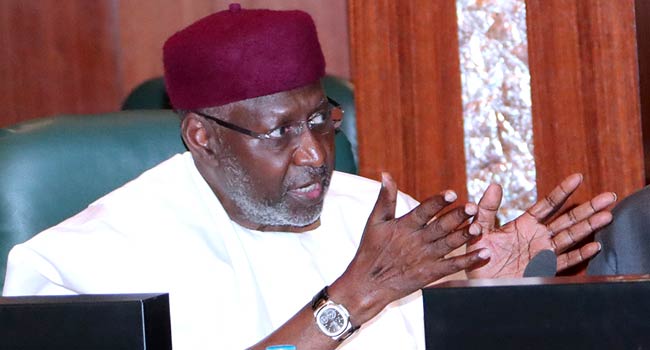
Since the death of Mallam Abba Kyari, the deceased Chief of Staff to President Muhammadu Buhari, the media has been agog with different permutations on who will occupy the position next.
Mr Kyari died last Friday in Lagos and was transferred to Abuja on Saturday for burial after battling with deadly Coronavirus. Meanwhile, many public affairs analysts including lawyers have said the constitution did not provide for the office of Chief of Staff. Hence, the position is illegal.
A Lagos based lawyer and right activist, Tope Akinyode, said that the office should be scrapped for its unconstitutionality. “Even though the President may delegate official functions to certain groups of people, “Chief of Staff” does not have the legal validity to act for and on behalf of the President for official purposes. By virtue of Sections 148(1) of the constitution, the President may delegate his executive functions to his Vice President, ministers but never on the “Chief of Staff”, he claimed.
In order to set the record straight, POLITICS NIGERIA examines what exactly the constitution says about the office.
Genesis
Politics as popularly said is a game of interest and most times, the practitioners appoint their loyalists at positions they consider very darling to them. Nigeria’s presidential system of government is an adaptation of the American presidential system of government with three arms. These arms are the executive, the legislative and the judicial.
While the legislative arm is saddled with the responsibility of making and order, the executive arm is expected to implement and the judiciary carries out the enforcement of laws and orders as well as carry out oversight functions on both the legislative and the executive arms.
In 1939, the then president of the United States of America, Franklin Roosevelt, was the first leader to create the office of the Chief of Staff at the federal level and to the Governor at the state level.
How is the appointment made?
Over the years, the loyalists to presidents or governors are made Chief of Staff as a political appointee without the ratification of even the legislative arm. Just like Abba Kyari, the occupants of the position are usually powerful and help in coordinating all other staffs working for the presidents or governors.
Before his death, Mr Kyari was seen by many as a de-facto president because he was deeply trusted by President Buhari and that is the same way it is at the state level.
At the state level, some of them grow to become the next Governor. Some examples include Babatunde Raji Fashola, who served as Chief of Staff to Bola Tinubu in Lagos before becoming the governor of the state.
In Abia State, after serving as the Chief of Staff to Orji Uzo Kalu for eight years, Theodore Orji also became the Governor of the state. Same repeated itself in 2018, in Osun State when Gboyega Oyetola became governor after serving Rauf Aregbesola for eight years in the state.
Responsibilities of the Chief of staff
Unlike the assumption of the public that a chief of staff is a figurehead, the occupants of the position carry out some responsibilities. These responsibilities include overseeing the day to day running activities of the president’s office and officers, selection, supervision and management of the key staff of the presidential office.
Beyond, he bridges the gap between the President and his core officials, including the Federal Executive Council.
What does the Constitution say?
Since many critics who oppose the office ofter refer to constitution, POLITICS NIGERIA had recourse to the provisions of the 1999 Constitution (as amended) to get a hand on the issue.
From our findings, the relevant part is Section 208 (1,2, & 5) which reads as follows:
Section 208:
“(1) Power to appoint persons to hold or act in the offices to which this section applies and to remove persons so appointed from any such office shall vest in the President or Governor of the State.
(2) The offices to which this section applies are, namely –
(a) Secretary to the Government of the State or Federation
(b) Head of the Civil Service of the State or Federation
(c) Permanent Secretary or other chief executive in any Ministry or Department of the Government of the State/Federation howsoever designated;and
(d) any office on the personal staff of the Governor/President
(5) Any appointment made pursuant to paragraphs (a) and (d) of subsection (2) of this section shall be at the pleasure of the Governor/President and shall cease when the Governor/President ceases to hold office.”
In view of the section quoted above and highlighted, the Governor or the President has the power to to appoint persons to any office as his personal staff; such appointees do not require the confirmation of the legislature and they shall cease to hold office when the president or the governor ceases to be in office.
By simple interpretation, the position of Chief of Staff is seen as the office on the personal staff of the President and as such is constitutional.
